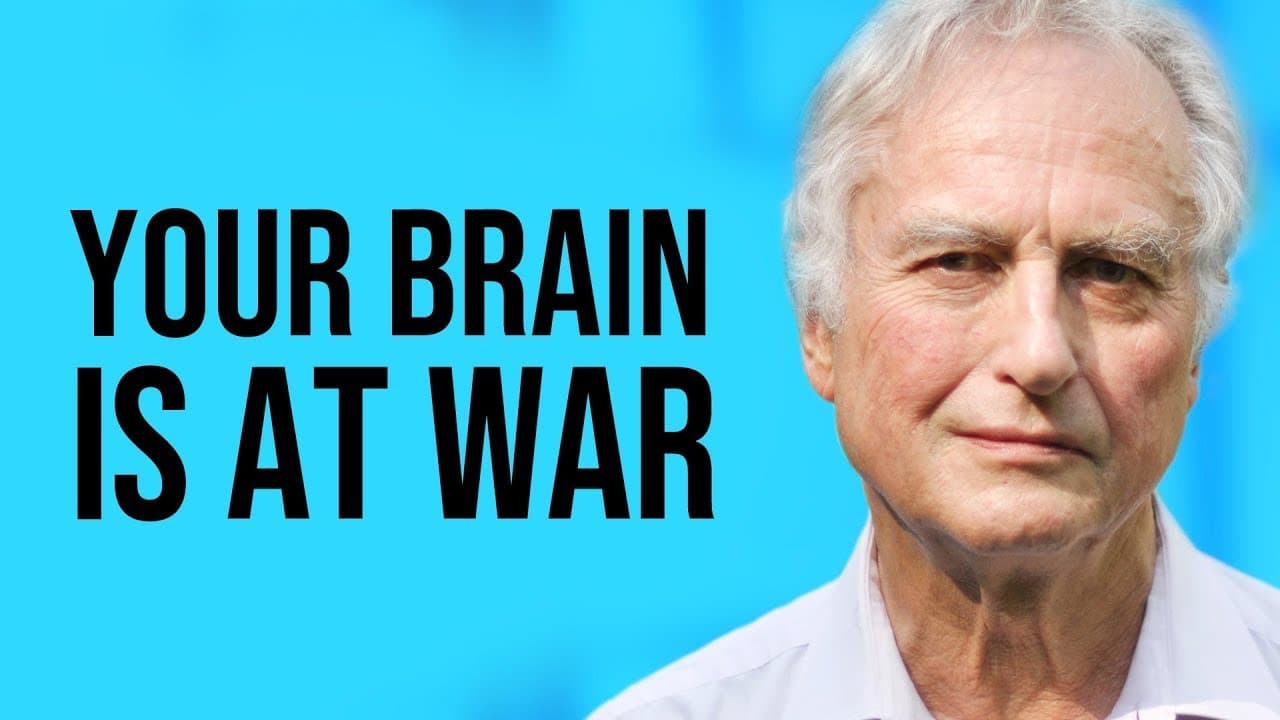*****
Summary of Transcript:
In this YouTube interview, Richard Dawkins discusses the connection between evolution and human behavior. He describes how our brains were shaped by natural selection for survival and reproduction on the African savannah, but have moved far beyond what was utilitarian for our ancestors. The conversation touches on the role of emotions in decision-making and how the brain is designed to paint experiences with emotions. Dawkins emphasizes the importance of balancing emotional response with rational thought, and fostering control of emotions through reason. The interviewee discusses the idea of context dependency in human behavior and the gap between stimulus and response that allows for conscious control over emotions. The conversation provides insight into the physical and evolutionary basis of human behavior and the role of science in understanding and shaping our culture.
*****
Summary of Description:
In this episode of Impact Theory with Tom Bilyeu, evolutionary biologist Richard Dawkins discusses the complexity of the human mind and the role of evolution in our emotions, thought processes, and sexual selection. They explore Dawkins’ latest book, Books Do Furnish A Life, and question whether science, technology, and the human search for meaning and exploration have surpassed our basic evolutionary need for survival. They also discuss the origin of life on this planet, the nature of consciousness, and the phenomenon of cultural evolution and memes.
*****
Richard Dawkins Explores How Evolution Shaped the Human Mind: A Deep Dive
Introduction to Richard Dawkins
Richard Dawkins is a world-renowned evolutionary biologist and author who has been influential in shaping modern evolutionary thought. In this episode of Impact Theory, Tom Bilyeu sits down with Dawkins to discuss his latest book, Books Do Furnish A Life, and explore some of the complex ideas surrounding the evolution of the human mind, emotions, and sexual selection.
How The Mind Works
Dawkins begins by exploring how the human mind works and how evolution has shaped it. He emphasizes the rational, thoughtful side of the brain and how it controls emotions. He believes that emotions are not something to be denied but need to be controlled by reason.
Nature of Thought and Emotion
Dawkins delves deeper into the nature of thought and emotion and how they are a result of evolution. He explains that thoughts and emotions have emerged from a long process of evolution that are rooted in our basic need for survival.
Emergent Properties Beyond Survival
Dawkins highlights how science and technology have developed far beyond our need for survival. He discusses how the emergent properties of evolution have given humans the ability to create and innovate beyond just basic survival needs.
Lack of Evolving Creativity
Although humans have evolved to an incredible level, Dawkins believes that human creativity has not evolved much. He argues that most creativity remains grounded in nature and only a few people push beyond those boundaries.
The Great Leap Forward
Dawkins explains the concept of The Great Leap Forward, which focuses on how humans developed complex technology and cultural advancements at a rapid pace. He believes that these advancements were a result of the emergence of sexual selection.
Evolution of Sexual Selection
Dawkins explores how sexual selection has shaped human behavior and society. He highlights how our uniquely large brains and complex language capabilities are a result of sexual selection, as having such traits made us more attractive to potential mates.
The Handicap Principle
Dawkins introduces the idea of The Handicap Principle, which suggests that certain traits may actually hinder survival but increase attractiveness to potential mates. He believes that this principle is responsible for many of the unique and complex traits that humans possess.
Human Sexual Selection
Dawkins discusses human sexual selection and how it has been shaped by cultural evolution. He explains that cultural evolution is a real phenomenon that has progressive qualities similar to biological evolution.
Genetic Variance
Dawkins explores genetic variance and how it gives rise to the diversity of traits that we see in humans. He explains how this variance allows for the emergence of creative and innovative individuals.
Finding the Origin of Life
Dawkins discusses the origin of life on Earth and how it is not as rare or implausible as many might think. He emphasizes that life is an emergent property of complex interactions and not a product of chance.
Natural Selection and DNA
Dawkins delves into the role of natural selection and DNA in shaping living organisms. He explains how DNA acts as a blueprint for living things and that natural selection acts upon this blueprint to create the vast diversity of life that we see today.
Writing Science Fiction and Morality
Dawkins discusses writing science fiction and explores the concept of morality from an evolutionary perspective. He argues that morality is not unique to humans and that it is an emergent property of complex interactions.
Hard Problem of Consciousness
Dawkins addresses the hard problem of consciousness and how it is an emergent property of complex interactions. He refutes the idea that every particle in the universe has consciousness and argues that consciousness emerges from the interactions among complex units.
Memes and Hyper Connectivity
Dawkins introduces the concept of memes, which are viruses of the mind that can go viral and become widespread through cultural evolution. He argues that memes can play a significant role in shaping human behavior and society.
Conclusion
This deep dive into how evolution has shaped the human mind, emotions, and sexual selection raises many important questions about our future. Dawkins and Bilyeu explore the complex interactions and emergent properties that have allowed humans to create and innovate at unprecedented levels. They challenge us to think outside the box, explore new ideas and embrace cultural evolution as a force for positive change.
*****
See Original Source
Source Description
This episode is sponsored by Blinkist. Go to https://blinkist.com/impacttheory Try it FREE for 7 days and save 25% off your new subscription.
Whether you believe that humans and other species have evolved or you believe in a creator of living things, this episode is going to excite you or challenge you to think outside the box. Both scenarios are worthwhile, as Tom is joined by the world renowned evolutionary biologist, Richard Dawkins. Trying to fully grasp how the human mind works and what role evolution plays with our emotions, thought processes and sexual selection can be overwhelming. Tom highlights the inspiring works from Richard and discusses some complex ideas from his latest book, Books Do Furnish A Life. This is a deep dive into what evolution is, and raises the question of whether or not science, technology, and the human search for meaning and exploration has surpassed our basic evolutionary need for survival. Where does that leave humanity and what options are potential solutions worth exploring?
Order Richard Dawkins new book, Books Do Furnish A Life: https://amzn.to/39fEeSU
SHOW NOTES:
0:00 | Introduction Richard Dawkins
1:34 | How The Mind Works
7:28 | Nature of Thought & Emotion
14:01 | Emergent Properties Beyond Survival
21:13 | Lack Of Evolving Creativity
29:30 | The Great Leap Forward
30:46 | Evolution of Sexual Selection
41:25 | The Handicap Principle
45:17 | Human Sexual Selection
57:13 | Genetic Variance
1:04:07 | Finding Origin of Life
1:10:55 | Natural Selection & DNA
1:27:29 | Writing Sci-Fi & Morality
1:37:58 | Hard Problem of Consciousness
1:41:32 | Memes + Hyper Connectivity
QUOTES:
“What I tried to do in my writing career is to emphasize the rational, thoughtful side of the brain, and to not deny the existence of the emotional, but to try to foster the control of the emotions by reason.” [6:48]
“What the human mind achieves today, in the form of science in particular, technology, is utterly bewildering when you think about it in an evolutionary context. It is so far beyond what we’re ever naturally selected to do.”
“The origin of life on this planet is not a highly implausible event, it’s not a very rare event…” [1:09:49]
“The idea that every particle in the universe has a minute mote of consciousness seems to me to be complete rubbish.” [1:39:17]
“It’s got to be a manifestation of great complexity of interacting units. No, one of which is conscious in itself, but when you put them together, consciousness emerges from the interactions among them.” [1:40:47]
“Cultural evolution is a real phenomenon, it really looks like evolution, it really has the same progressive qualities as evolution does.” [1:42:39]
“I introduced the idea of the meme as a virus of the mind. Something that goes viral is this successful meme.” [1:45:56]
Follow Richard Dawkins:
Website: https://richarddawkins.net/
Twitter: https://twitter.com/rdfrs
Facebook: https://www.facebook.com/RichardDawkinsFoundation/
Instagram: https://www.instagram.com/richard_dawkins/
YouTube: https://www.youtube.com/user/richarddawkinsdotnet

